Joby J Ford on his double life with Mariachi El Bronx
The punk guitarist on his musical alter ego
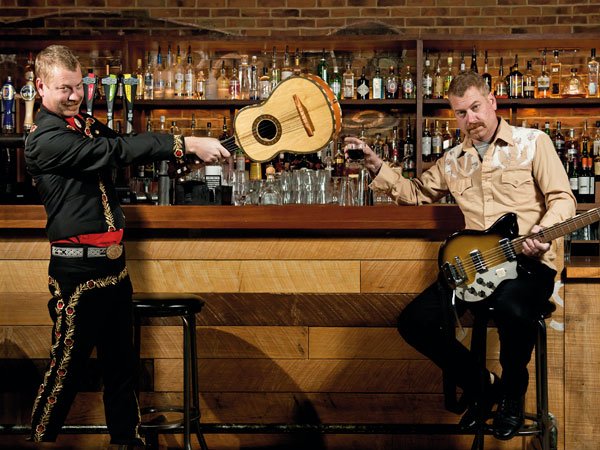
Introduction
Meet a hombre with two very different sides. Despite being mainly known for his work in LA punk bruisers The Bronx, guitarist Joby J Ford has also been exploring more exotic sonic tapestries through alter ego Mariachi El Bronx. We had to find out more...
Joby J Ford is not your average punk-rock guitarist. Sure, he likes cranking his Les Paul through a vintage Marshall just like the rest of us. But listen to any Mariachi El Bronx album and it's clear there's a lot more to him than The Bronx's visceral punk-rock fury.
"Boredom will never be an issue"
Deciding to launch a very different second line-up as Mariachi El Bronx in 2009, and releasing a collection of songs that had more in common with Mexican folk music, was certainly a brave move - especially when fans were awaiting more of the same - but it paid off.
No longer a side project, both bands now coexist together in the guitarist's life and make it that much more interesting. And, as we'll learn from the man himself, "boredom will never be an issue" for Joby J Ford. After all, how many other players can say they know their way around a vihuela or guitarrón?
Joby also owns LA's Big Game Lodge Studio, where he's worked with big-name indie artists including The Enemy and Carl Barât, singer of The Libertines. Like we said, not your average punk-rocker... 
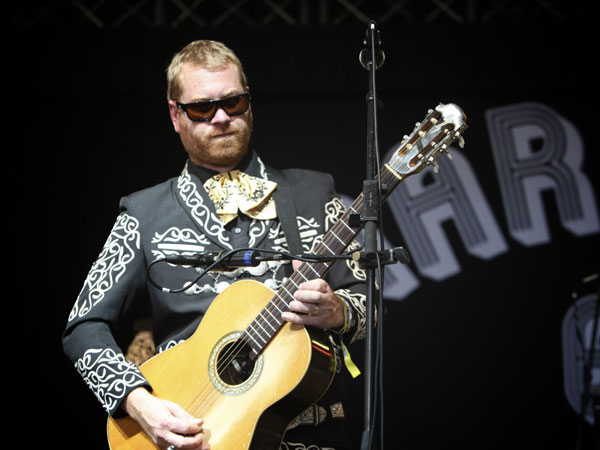
Making the mariachi
When were you first exposed to mariachi music and what effect did it have on you?
"I was obsessed by the juxtaposition of music that sounded like it came from the circus with what essentially is gangster-rap lyrics"
"Well, living in Southern California, that's kinda all you hear! There's predominantly Latin radio stations and lots of Latin people, so it's a familiar sort of sound. And like rock, it's a genre which has many sub-genres.
"The thing that drew me to that type of music was its similarities to polka, because it was influenced by Germany coming to Mexico, introducing accordion and polka to their culture.
"I was absolutely obsessed by the juxtaposition of music that sounded like it came from the circus with what essentially is gangster-rap lyrics. That was so mind-blowing and fascinating to me!"
Gangster-rap lyrics? That sounds pretty out there!
"It's been getting quite a lot of press recently. There's a style of music called Norteño, which comes from the north. There was a guy, Chalino Sánchez, who was basically paid by the drug lords to write songs about them. You know, how many guns they have, how many women they've slept with, how crazy they are... It was the 80s, and you weren't cool unless you had a song about yourself!
"Chalino Sánchez was one of the first to accept payola for what's called a ‘narco-corrido'. That was my entry point for wanting to learn how to play some of that stuff."
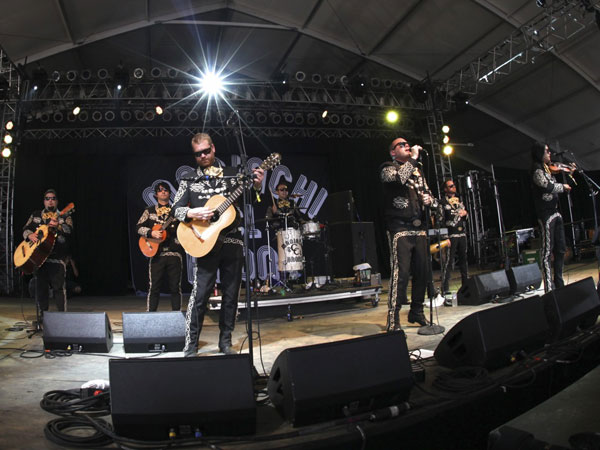
Liberation/liberacion
So it must be liberating to be able to switch between playing punk-rock in The Bronx and mariachi music with Mariachi El Bronx?
"I'm the whitest guy ever, you know? But the idea of taking mariachi and using English lyrics felt kinda punk"
"I feel very lucky. It keeps things fresh, this could never get old even after years and years. I know boredom will never be an issue, because with us, it never stops. Finish one record, write the next record on tour, then record that. But it keeps you from doing stuff you're not supposed to be doing! [laughs]
"I'm a punk guy. I'm not Latin, I'm the whitest guy ever, you know? But the idea of taking mariachi and using English lyrics felt kinda punk, not many people have done that before. So at least in my head it was punk: doing my own thing, ‘fuck you, man' and all of that!"
And now there's another band, too... You play guitar in Pounded By The Surf?
"Yeah, we just wrapped up our first record with the surf band! It's made up of El Mariachi Bronx members, playing different instruments. I play these ratty old Teisco guitars and it's all-instrumental!
"A bit like Duane Eddy, that kinda Western desert-meets-the-ocean vibe, cowboy hats... it's ridiculous. So now we get to open up for the mariachi band, just like how Mariachi opened for The Bronx!"
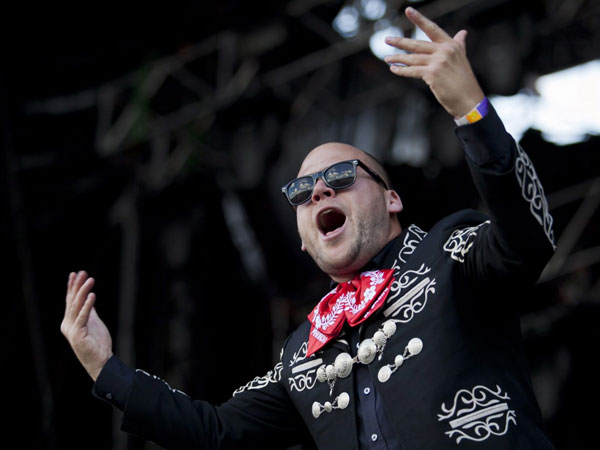
Clocking on
So how do you balance your time?
"It's just whatever me and Matt want to do at the time. We'll swap ideas for what kinda record we wanna make. ‘This is what I'm thinking, what do you reckon?' and that kind of thing. Then brainstorm and start turning them into songs. We probably throw more away than we keep!
"A lot of what we do is instrumentally dictated, because these things aren't factory-made"
"You know, I didn't do very good at school, I majored in art and I did okay in my classes. I learned early on that I wasn't good at doing anything other than making stuff. I'm better at writing a song or whatever than studying for history!"
What are the main challenges in using flamenco guitars, as well as other acoustic instruments like vihuelas and bajo sextos?
"A lot of it comes down to practice. The best way I can describe it is being in shape for a sport, you can't just go do it! When we do the mariachi band, I have to practise and I hate practising.
"If I've been playing electric for a while, I'll really need time to sit with the acoustic instruments; it's a completely different approach. You make a mistake on a distorted amp and it's no big deal, but on these god-damn crude instruments it's like, ‘Wow, that guy messed up!'
"A lot of what we do is instrumentally dictated, because these things aren't factory-made. There's a little man in a shop gluing this stuff together and if the humidity is different that day, the instrument will be, too. They're never in tune! You can get 'em close, but have to play stuff a bit sharp or flat. All of the mariachi instruments are in fucked-up tunings."
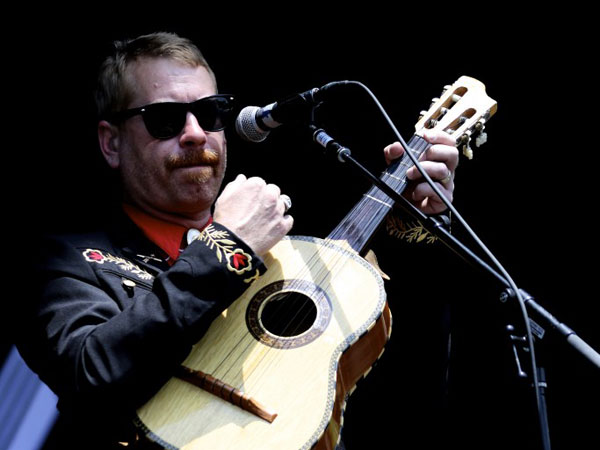
Crossing over
Have you found any similarities between mariachi music and your punk-rock roots?
"Well, it's like rock 'n' roll in the sense you have to use whatever you've got. Look at The White Stripes: drums and guitar. In mariachi music, you can have just two instruments. Or three musicians is called a Tres and a full mariachi is generally about 25 people. It's a symphony!
"It's completely different to rock 'n' roll and I find myself learning new things every day!"
"All mariachi music is traditional - much like classical, they study the greats. And it's kinda about who does the best version. But we don't want to do that, we've done a few covers in the past, but they sounded terrible because that's not really what we do. So overall, it's completely different to rock 'n' roll and I find myself learning new things every day!
"The way traditional mariachi works is not like a band. There is a boss who manages their business and their sound. The musicians are a rotating staff of people, it's not like starting a band with your buddies. You sign a two-year contract and you can't play for anyone else for a year after. It's crazy!
"So there are bands that have been going for 30 years and the name is still going because it's a business, not a band. There might be one original guy still in it! If Metallica didn't have Lars, it wouldn't be the same, but with the mariachi guys they'd just get the next guy in!"
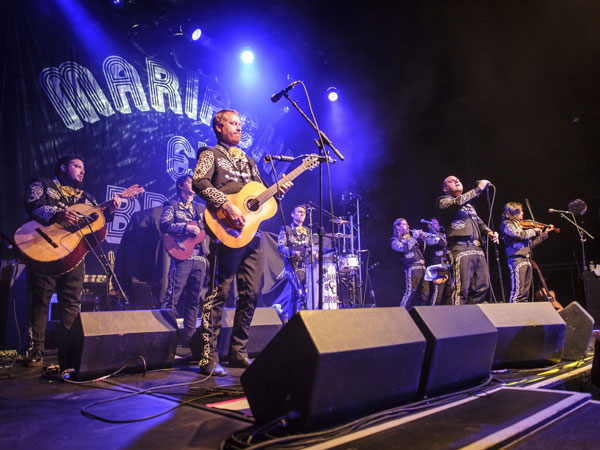
A beginner's guide...
What's the main ingredient to your mariachi sound?
"You gotta realise that we're playing instruments that aren't meant to be amplified. They are built in a certain way to be loud acoustically. So the science behind humbuckers and single coils doesn't really apply to this stuff, nothing exists for this stuff. You can't put a bridge or magnetic pickups in these things.
"We used to go to Los Lobos' house as kids, we've known them forever"
"LR Baggs were really into working with us because there was nothing out there - they tried all sorts of stuff out for me and I can't thank them enough. We were already using their Venue DI, which has this really clever notching feature where you can take out certain frequencies, which helps, as these instruments feedback like crazy!
"I have an Xotic RC Booster preamp to shape up the vihuelas with a bit more compression and focus. That's pretty much my signal chain."
Which artists would be a good starting point for someone totally new to mariachi?
"The number-one starting point would be Los Lobos from Eastern LA. Our guitarrón player Vincent Hidalgo's dad plays in them. We used to go to their house as kids, we've known them forever. They were a big band for us and they did the soundtrack to the movie La Bamba, which was pretty famous!
"That band shaped us more than anyone else, and I think it's a good place for English-speaking people to start from. They do all the classics and have done some songs in English, so it's probably ground zero.
"Cumbia is a type of music that is extremely popular in LA, it's probably unlike you've heard over in Europe. Everyone comes out and dances for the big Cumbia nights - it's a style of music that white people can dance to! So one great band to check out would be Very Be Careful.
"And of course, Chalino Sánchez for narco-corrido. His voice sounds tlike a cat getting choked out, it's awesome! I'd also recommend Trio Los Panchos for more of a Veracruz sound."
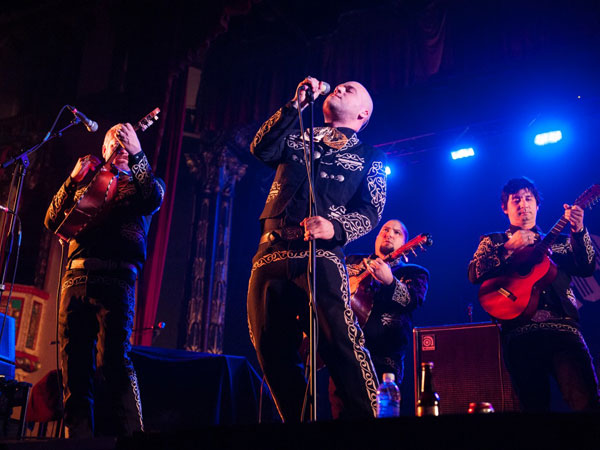
Producing the goods
You're also well known for your producing talents. What made you want to learn more about the science behind recording music?
"I'm a music fan first and foremost. I mean, I had a meeting with Pixie Geldof this morning! I like making music and, as you might have guessed, I don't have a specific style I stick to.
"I've chosen absolutely not to produce The Bronx because I'm in the band, and it wouldn't be a band if I did that"
"Me and Carl Barât talked about making a record and I said it'd be great to have British songwriting with that big American drums and guitar sound... so that's what we did!
"He's a great lyricist that really knows how to put words together. I think, whether it's in the band's best interest or not, I'm good at piecing the puzzle of a song and bringing organisation to their thoughts. Sometimes they like it, sometimes they can be like sticks in the mud, which is fine - it's their music!
"I love listening to things back on the speakers and feeling the excitement when bands are shaking their heads and can't believe what they're hearing is them."
But you've opted out of producing your own bands?
"Yeah, I've chosen absolutely not to produce The Bronx because I'm in the band, and it wouldn't be a band if I did that. I don't really feel it's my place. I really like working with other producers and I learn a lot from them. When I'm writing music, I get really close to it, so it's nice to have someone else suggesting new things or voicing their opinions."
Amit has been writing for titles like Total Guitar, MusicRadar and Guitar World for over a decade and counts Richie Kotzen, Guthrie Govan and Jeff Beck among his primary influences. He's interviewed everyone from Ozzy Osbourne and Lemmy to Slash and Jimmy Page, and once even traded solos with a member of Slayer on a track released internationally. As a session guitarist, he's played alongside members of Judas Priest and Uriah Heep in London ensemble Metalworks, as well as handling lead guitars for legends like Glen Matlock (Sex Pistols, The Faces) and Stu Hamm (Steve Vai, Joe Satriani, G3).


